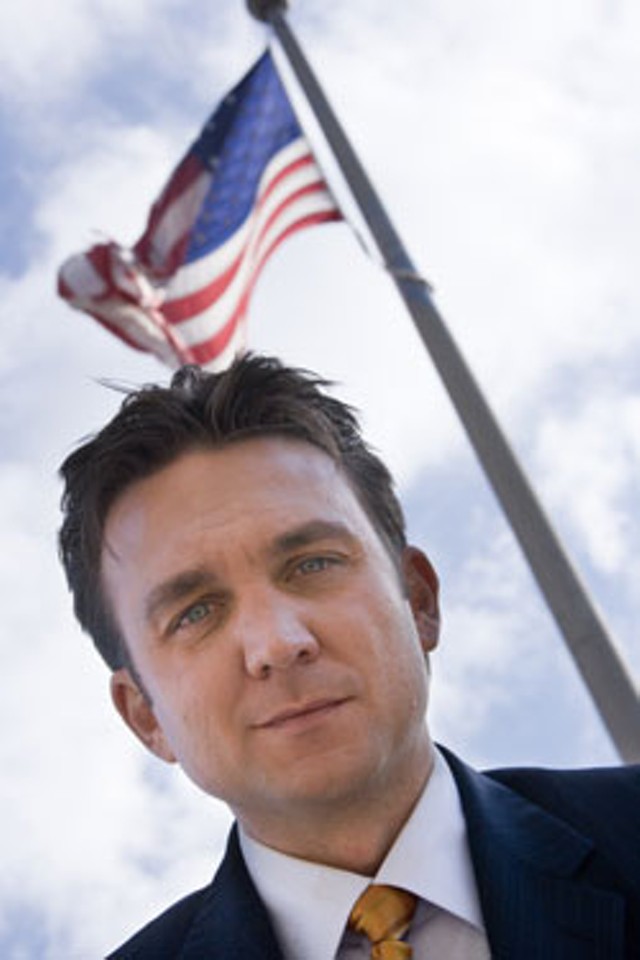Published June 10, 2008 at 3:06 p.m.
It would be hard to cast someone better to represent “red-blooded Americans” on-air than Josh Rushing. At least, the Pentagon’s Central Command thought so in 2003, when it chose Rushing as its official spokesperson in the Arab media during the Iraq invasion.
Rushing, then a Marine Corps press officer, grew up in the tiny town of Lone Star, Texas, where his father is the fire chief and his mom serves on the city council. As he puts it, “I joined the Marines because I grew up believing in civic service.”
If Rushing’s story sounds familiar, it’s probably because he was featured prominently in the 2004 documentary Control Room, about the Arab satellite news network Al Jazeera. At the time, Rushing had no idea the movie was being made. But shortly after its release, Rushing resigned after 17 years in the Marines, primarily because the military ordered him to stop speaking publicly about the press coverage of the war.
Several months later, Rushing was hired as a “presenter,” or correspondent, for Al Jazeera English in Washington, D.C., where he’s worked ever since. He admits he hasn’t been following the controversy over Burlington Telecom’s recent move to pull Al Jazeera English off the air. Rushing has been traveling the globe for months working on a six-part series called “On War with Josh Rushing.” He bills it as “a shamelessly intellectual look at war as a universal force.”
This week, Rushing canceled a 90-minute talk he was scheduled to give to 250 senior officers at Joint Forces Command in Norfolk in order to be in Burlington for Wednesday night’s public hearing on Al Jazeera. Seven Days spoke to Rushing by phone last week and asked him to address some of the criticisms of his network, including claims that it’s anti-American, anti-Israel and a mouthpiece for Al Qaeda.
SEVEN DAYS: Is Al Jazeera Arabic fundamentally different from Al Jazeera English in its tone, nuance or content?
JOSH RUSHING: It’s tough for me [to answer], because I can’t understand [Arabic] well enough to know exactly what they’re saying. But I do watch it a lot and the pictures tell the story on television. The real difference in the networks — and they are different networks — is what their missions are. Al Jazeera Arabic’s mission is to report the world for an Arabic-speaking audience. That’s a regional news service. Our mission is to report the world to anyone in the world who speaks English, which is much more of a global audience . . . So they may report different stories than we report, or even the same story . . . in a different way.
SD: Editorially, they’re independent from one another?
JR: That’s true.
SD: Does the Qatar government influence or censor your content?
JR: I was one of the very first people hired at Al Jazeera English, and in my entire experience here in three years, I’ve never been aware of any influence whatsoever that the government has put on the network to cover something a certain way, or not cover something a certain way. The charter we’re set up on is kind of stolen from the BBC. It . . . sets up an editorial license to report on whatever we want to report on. And there have been significant examples of [Al Jazeera] turning that spotlight on the Qatari government.
SD: Currently, Al Jazeera English is available on only two cable systems in the United States. Is that because Americans don’t want it, or that cable systems are afraid of alienating subscribers?
JR: I happened to be in on the distribution meetings before we launched [in November 2006.] It was much less a matter of politics and much more an economic situation. [The U.S. cable systems] essentially said, “We have the numbers to prove that Americans don’t care about international news. That’s the same reason we’re not going to let the BBC World in, or put CNN International on its own channel.” They considered us a low-viewership channel. And they’re in a bandwidth crunch, cable more so than satellite. They’re very reluctant to give up that much bandwidth for a [high-definition] channel that won’t make them much money.
SD: The same argument has been made for removing Al Jazeera from Burlington Telecom. Is that a valid criticism?
JR: Here’s where I think they’re wrong. In the 1980s, Ted Turner wasn’t a genius for starting a 24-hour news channel [CNN]. He was a genius for figuring out how to get it distributed. That was unusual because everyone said, “Who wants to watch news at work all day long?” But he knew before the distributors knew what was coming. I think we’re in a similar place today. As the world is becoming more globalized, as people in Indiana know that the economy of India affects them, they’re going to want to know what’s happening in India. I think there’s a marketplace out there.
SD: Where else does Al Jazeera air?
JR: It also plays in many buildings in Washington, D.C. . . . What’s funny about that is, the Pentagon gets it and they watch it. My producer was at a dinner party the other night and a woman came up and said, “My daughter works at the CIA and they all watch Al Jazeera and they love it.” I got [an email] a couple of weeks ago from a Marine in Kabul, Afghanistan. He said they have Al Jazeera on in the gym and they love it.
SD: Why do military personnel watch it?
JR: They watch the American news and they feel like Americans have often forgotten that they’re even there. Now, to get on [American] cable news, it’s got to be about the election or it’s not going to get on. And these guys are there fighting a war! When they watch Al Jazeera English, they’re getting a real sense of what’s happening in the world . . . Anyone who has a real personal stake in international affairs — and it’s hard to argue that anyone has more of a personal stake than military people — they are actually fans of what they see on Al Jazeera English.
SD: Does Al Jazeera broadcast anti-American or anti-Israeli propaganda?
JR: I was just with a two-star general in Iraq who was showing me around the detainee operations there, which he’s in charge of. And when we were at Camp Buka, the largest detainee facility in Iraq, he pulled together all his commanders [who watch] Al Jazeera over there . . . Anyone who says this is propaganda for some Arab perspective just simply has not seen it. I guarantee you.
SD: What was your own impression of Al Jazeera prior to going to Iraq?
JR: I thought negative things about Al Jazeera as well until I was assigned by Central Command to be the face on Al Jazeera during the invasion in 2003. And being there and actually seeing it, I came to realize it was not what I thought it was. It was not what [then Secretary of Defense Donald] Rumsfeld was calling it.
SD: He accused Al Jazeera of showing beheadings.
JR: They have never shown a beheading, and that’s a very simple fact that’s easy to prove. The European papers that printed that have since apologized for it.
SD: What about the allegation that your network is a mouthpiece for Osama bin Laden and typically is the first to air his threats against Americans?
JR: Al Qaeda used to send its tapes to Al Jazeera, but that doesn’t happen anymore. Anyone who’s watched in the last year and a half [knows that] those messages show up online first. And they do that because they’re frustrated with Al Jazeera . . . Bin Laden has called Al Jazeera pro-Western, pro-Zionist. [Ayman] al-Zawahiri, the founder of Al Qaeda in Iraq, called for attacks against Al Jazeera in Iraq for not calling his movement a Mujahideen. So, the people who say Al Jazeera is the mouthpiece of Al Qaeda are not reading anything that Al Qaeda is saying.
SD: What do you hear from Israelis?
JR: I’ve never been to Israel, but there’s an easy way to look at this. The Jerusalem Post ran a poll that said more Israelis watch Al Jazeera than CNN or Fox. Israel pulled BBC World off its system and put Al Jazeera English in its place . . . Most of the Arab world had never seen a Jew until Al Jazeera put them on doing interviews in Hebrew . . . Al Jazeera broke that taboo. It’s one of the reasons bin Laden and Zawahiri call it pro-Western and pro-Zionist . . . Anyone who lives in Israel, anyone who really cares about the issues over in Israel, Palestine and the Middle East knows that Al Jazeera is the voice of credibility in that region . . .
SD: Is it good that Vermonters are debating the content of your network?
JR: Yeah, I definitely encourage this debate. I wish this were a national debate, because so much of the animosity is based on patently false claims . . . Once you’re presented with the truth . . . you just have to acknowledge what the truth actually is . . . Mind you, Al Jazeera Arabic has been broadcast in America for 10 years now on the Dish satellite system . . . The same people who told you that it’s the mouthpiece of Al Qaeda and that it shows beheadings are the same people who told you that there were WMDs in Iraq, that Saddam had ties to [9/11] and that, by the end of 2003, there’d only be 30,000 troops left in Iraq.
****************
Three reps from Al Jazeera English are slated to appear live on Channel 17 on Tuesday, June 10th at 6pm. Guests include Tony Burman, Managing Director and Correspondent Josh Rushing. Members of the public are welcome to join us at Channel 17 studios at 294 North Winooski Avenue (second floor) in Burlington, Vermont.
Members of Burlington's citizens advisory committee on telecommunications (BTAC) and the State-approved citizens Cable Advisory Council for Burlington Telecom (BCAC) will be on hand at a public forum on Wednesday, June 11 to hear and record comments regarding Burlington Telecom's carriage of Al Jazeera English on its cable television channel lineup.
The public forum will begin at 6:30 p.m. in the Hauke Conference Room at Champlain College, Maple and Willard Streets, Burlington. Members of the public will be asked to limit their comments to under three minutes.
VIDEO: See the Channel 17 coverage of public meetings concerning Al Jazeera
More By This Author
Speaking of...
-

Media Note: Stewart Ledbetter to Retire After 40-Year News Career
Jan 29, 2024 -

During a Previous Explosion of Mideast Bloodshed, a Journalist and His Family Straddled the Divide
Nov 1, 2023 -

UVM’s New School of the Arts Gathers Many Creative Disciplines Under One Roof
Sep 14, 2022 -

Are There a Lot More Dicks on Television Lately?
Apr 13, 2022 -

Fletcher Free Library Branch Coming to Burlington's New North End
Nov 19, 2021 - More »
Comments
Comments are closed.
From 2014-2020, Seven Days allowed readers to comment on all stories posted on our website. While we've appreciated the suggestions and insights, right now Seven Days is prioritizing our core mission — producing high-quality, responsible local journalism — over moderating online debates between readers.
To criticize, correct or praise our reporting, please send us a letter to the editor or send us a tip. We’ll check it out and report the results.
Online comments may return when we have better tech tools for managing them. Thanks for reading.














































